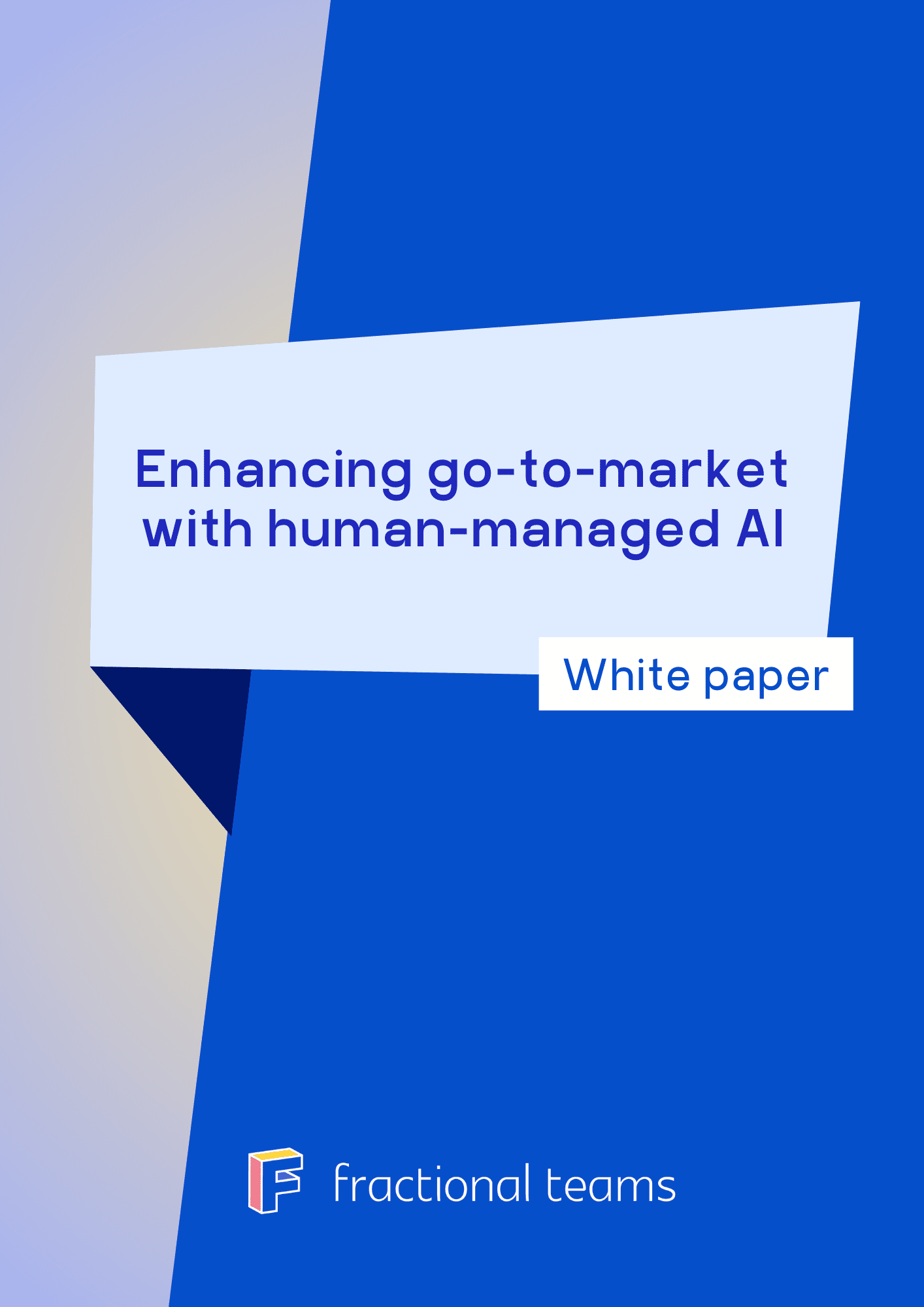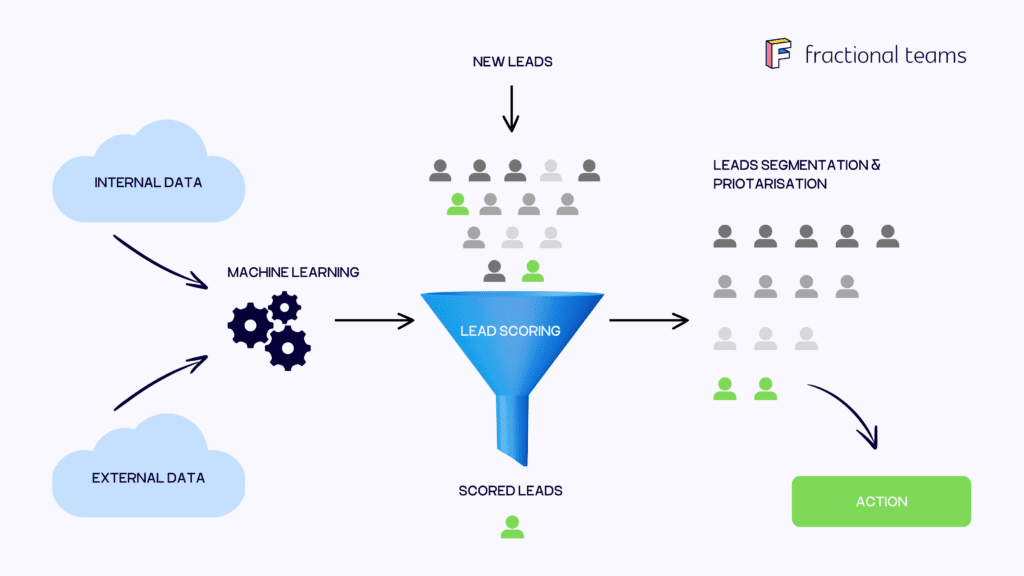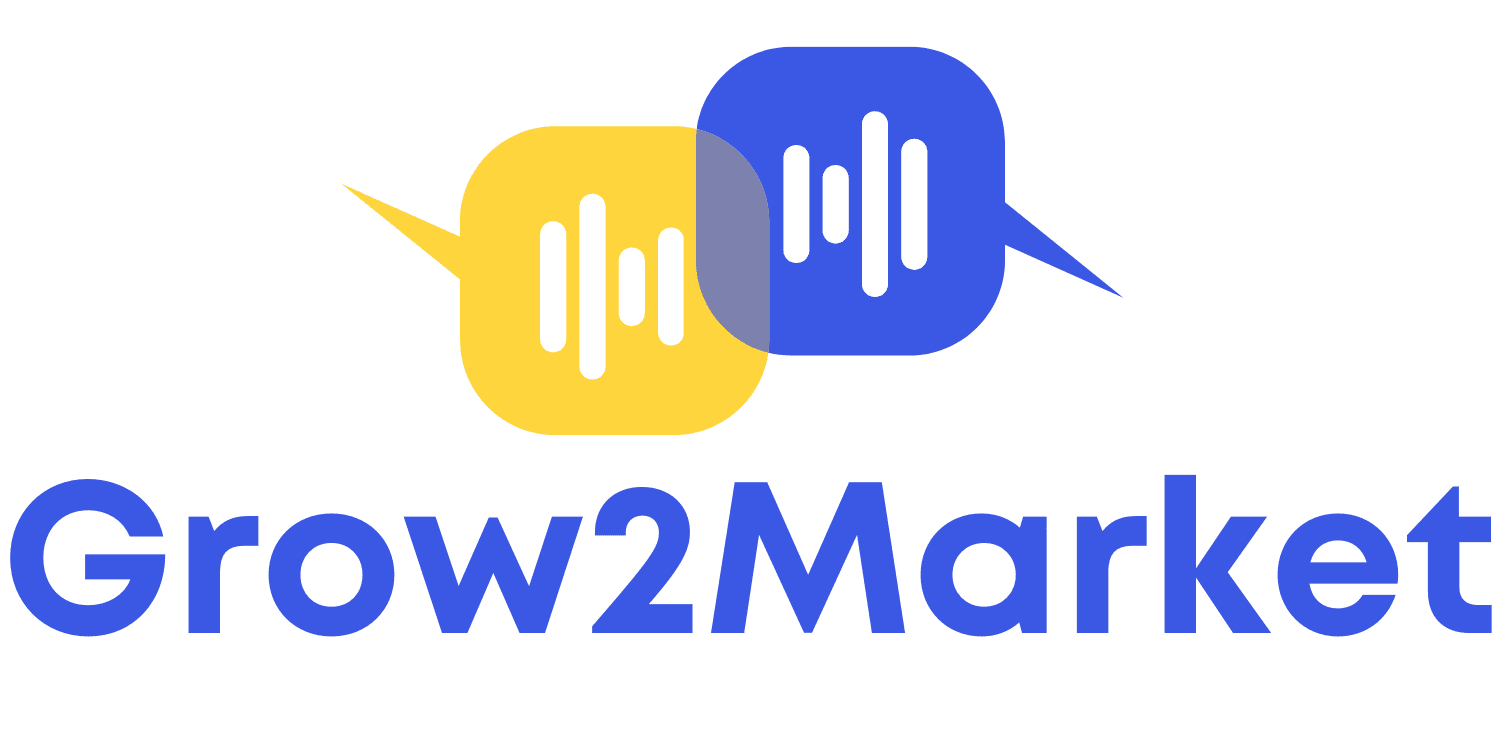AI in B2B advertising and sales
In this fourth and last article of the Enhancing go-to-market with human-managed AI series, we tackle AI’s influence on advertising and sales, showing how it can assist and enable businesses to execute targeted ads and augment outreach efforts. This highlights the accuracy and efficiency AI brings to marketing and sales strategies, ensuring messages reach their intended audience effectively without losing valuable leads throughout the sales and marketing funnel through lazy and unappealing AI-only approaches.
No doubt that AI has brought a revolution in the marketing landscape across various industries. Although there is still a lot of scepticism about using AI among B2B marketers due to its relatively new technology, more and more specialists are starting to use AI tools for their daily tasks, and this extends beyond copywriting.
Download white paper
Get immediate access to all parts of the series
Download the white paper to get immediate access to all parts of the “Enhancing go-to-market with human-managed AI” series. The white paper provides business owners with guidance on how AI, integrated with human oversight, can revolutionise market strategy, drive growth and enhance customer satisfaction.

Impact of AI on B2B sales & marketing
To succeed in B2B sales, it is important to understand your potential customers and establish a level of trust within your niche to expand your customer base. AI’s effect on B2B sales and marketing is significant and complex, fundamentally transforming how businesses engage with their clients and prospects.
Using predictive analytics and AI’s machine learning capabilities, B2B marketers can predict their customers’ needs, forecast market trends, and identify new opportunities with great accuracy. This results in more effective and efficient sales strategies, where outreach efforts are not generic but personalised messages to meet the specific needs and behaviours of each segment of the target audience.
After exploring how AI can help B2B businesses identify market segments, boost customer satisfaction and contribute to content planning, this section will focus on the key ways AI can optimise sales and advertising strategies.
We will focus on the following persona profile to show some examples of how businesses can implement AI in their sales and ads strategies.
Persona 2: The Strategic Growth Leader
Name: Michael Johnson
Age: 48
Location: New York, United States
Job Title: CEO
Company Size: Small to medium (SME) (10-50 employees) transitioning to medium-sized (50-250 employees)
Industry: Software Development
Short Bio: With an entrepreneurial spirit and a background in computer science, Michael has founded and grown several tech startups into successful scale-ups. He has a keen eye for new market opportunities and is adept at strategic planning, leadership, and fostering a culture of innovation.
Outreach with predictive lead scoring
AI-driven predictive lead scoring uses machine learning algorithms to analyse historical data and behavioural patterns of leads to determine their likelihood of converting. This approach allows businesses to focus their efforts on the most promising prospects, increasing conversion rates and optimising sales resources.
For Michael Johnson, incorporating AI-driven predictive lead scoring into his company’s operations aligns perfectly with both his goals and challenges. Here’s how the key strategy could be focused and adapted for him:

Seamless CRM integration
Objective: Implement an AI tool that integrates smoothly with the existing CRM system. This is crucial for Michael’s company as it transitions from a small to a medium-sized enterprise. The tool should support the dynamic prioritisation of leads based on their predicted conversion likelihood.
Action: Consider AI solutions compatible with the company’s current CRM system to automate lead scoring efficiently without significantly changing existing workflows.
Data-driven decision making
Objective: Use historical data and real-time analytics to refine lead scoring models continuously. This approach enables the identification of high-potential leads, optimising sales efforts and resources.
Action: Collect and analyse historical conversion data, integrating this information with AI tools to refine the predictive scoring process. Implement a feedback loop where sales outcomes inform and improve lead scoring accuracy over time.
Focused expansion efforts
Objective: Use predictive lead scoring to identify and prioritise market opportunities that align with strategic goals for international expansion and innovation.
Action: Use the insights gained from AI-driven lead scoring to focus on regions and sectors showing the highest conversion potential, aligning with Michael’s goal of sustainable and strategic international growth.
Using AI to create hyper-targeted ad campaigns
The variety of AI-powered tools available today have proven to be effective not only for copywriting and automation but also for managing and maintaining ad campaigns. With the help of AI, running effective ad campaigns that target the right audience seems to be less difficult now.
For companies like Michel’s, integrating AI into ad campaigns can be especially beneficial as it reduces the need for complex manual research, including copy creation, A/B testing, and more. This not only saves time but also allows for a more strategic allocation of the marketing budget.
Let’s take a closer look at some of the effective ways to implement AI-powered ad targeting for Michel’s company.
Dynamic keyword optimisation
Objective: Continuously adjust and optimise the keywords used in search ad campaigns to match the search trends and preferences of the target audience.
Action: Use AI tools to analyse search query data in real-time, identifying trends and underperforming keywords. This allows for the dynamic adjustment of ad campaigns to ensure they remain relevant and competitive.
Personalised ad copy
Objective: Create ad copy that resonates with the specific needs, interests, and pain points of different segments of the target audience.
Action: Use AI-driven content generation tools to produce varied and highly personalised ad copy versions. These tools can analyse data from previous campaigns and customer interactions to generate copy that is more likely to engage and convert each segment.
Performance prediction and bid optimisation
Objective: Maximise the ROI for each ad campaign by predicting performance and optimising bids accordingly.
Action: Apply AI algorithms that forecast the performance of different ad variations, considering factors like keywords, ad copy, and target demographics. Use these predictions to allocate budget more efficiently, placing higher bids on ads likely to perform well and reducing spend on lower-performing ads.
Industry engagement and thought leadership
With AI being on everyone’s lips today, showcasing some smart use examples of how your company is adopting this technology can increase your brand visibility and generate meaningful conversations around your business.
Brand communication can be a powerful tool, so it’s important not to miss out on this advantage, especially when traditional marketing strategies may not be enough to meet the demands of your audience.
Based on our persona example, we suggest some simple yet proven to be effective actions that you can consider adding to your strategy.
Objective: Position Michael and his company as leaders in adopting innovative AI in the software development industry.
Action: Share success stories and insights on using AI technology for business growth through industry forums, social media platforms, and speaking engagements. Focus on the challenges faced, the solutions implemented, and the actual business outcomes achieved.
LinkedIn and Twitter are probably the most popular platforms for sharing thought leadership content. However, don’t overlook Reddit. It’s a hub for vibrant discussions and has numerous subreddits related to AI, software development, and business growth strategies. This will not only boost your personal brand but also attract top talent and potential partners.
5 best AI marketing tools for B2B tech and SaaS companies
HubSpot offers an all-in-one marketing automation platform with artificial intelligence capabilities. Its predictive lead scoring software uses AI to check the lead’s past behaviour and predict who’s more likely to buy from you. This way, you can concentrate on the most promising leads without changing your usual workflow, helping your business grow in a smart and straightforward manner.
AdCreative.ai is an AI-based solution that helps businesses and marketers produce conversion-focused creatives and texts for a range of advertising campaigns. This tool uses machine learning algorithms to analyse consumer behaviour patterns, allowing you to craft a more engaging experience for your target audience.
Keyplay is an AI-powered account scoring tool that helps sales and marketing teams identify and prioritise target accounts. It collects and analyses data to score accounts, allowing teams to focus on the most valuable prospects.
HeyGen is an AI video generator that specialises in creating personalised marketing videos. This tool offers features like customisable avatars, text-to-speech, and multi-language support, making it ideal for creating engaging video content tailored to diverse audiences.
SE Ranking provides a range of AI-driven tools, such as the On-Page SEO Checker and Keyword Suggestion Tool. These tools help marketers optimise their content for search engines, identify valuable keywords, and conduct comprehensive competitor analysis. SE Ranking’s AI capabilities help automate and refine marketing strategies, making it a valuable tool for B2B tech and SaaS companies looking to boost their rankings and improve engagement.
Enhancing go-to-market with human-managed AI
Within recent years, AI is a buzzword that has been popping up everywhere, transforming how businesses operate and interact with their customers.
Adopting AI technology allows businesses to quickly and accurately identify customer segments and personas, improve customer satisfaction and create content that not only attracts but also retains audience interest. AI’s influence extends into advertising and sales, where the rich choice of tools allows businesses to analyse vast amounts of customer data, create complex advertising campaigns and capture the most relevant leads.
The blend of AI capabilities and human touch can transform traditional marketing into a more efficient, responsive, and personalised field. However, even with these advancements, the human element is irreplaceable. AI may simplify and speed up strategy development, but it won’t replace human invention, originality, creativity, intuition, and emotional intelligence, which remain the foundation for strong and long-lasting relationships with customers.
Dariia Panchenko
Hi! I'm Dariia Panchenko, Analytics and Community Manager at Fractional Teams. I write about the best B2B marketing strategies and practices.
